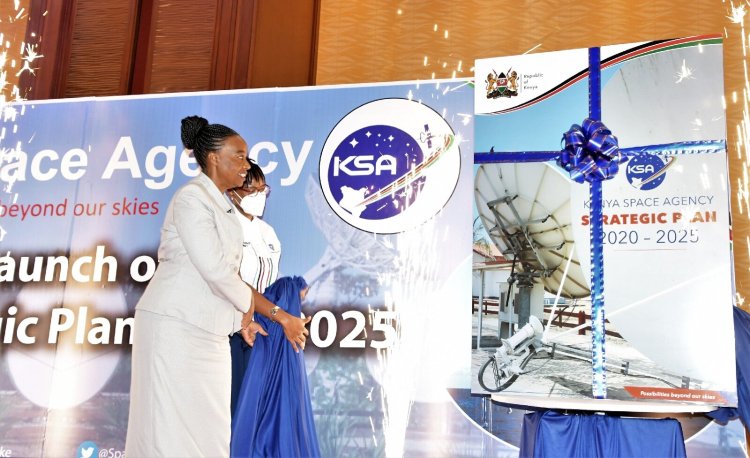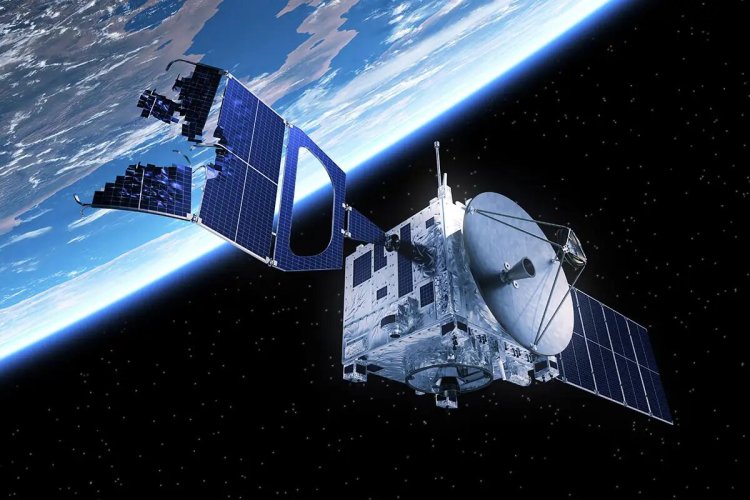Inside Elon Musk's Rocket Set To Carry Kenya's Satellite To Space
The satellite was developed by KSA with help from Exolaunch, a German provider of global launch, integration

Kenya will on Tuesday, April 11 join an elite list of countries boasting a satellite in space through world-renowned billionaire, Elon Musk.
According to a report by CGTN Africa on Monday, April 3, the country, through Kenya Space Agency (KSA), will launch its first-ever earth observation satellite with the help of Musk's company, SpaceX.
"The Kenya Space agency is set to launch the country’s first earth observation satellite, #Taifa-1, on April 11. SpaceX is assisting Kenya in the mission.
"One of SpaceX's Falcon 9 rockets will carry the Kenyan satellite into space," the report read in part.

The opening of a space sector forum dubbed “The Space Sector we want in Kenya” attended by Defence CS Monicah Juma on February 26, 2021. /TECHWEEZ
KSA also indicated that the satellite was designed to tackle severe drought, wildfires, and natural disasters that have devastating impacts on East Africa Community (EAC).
“Taifa 1 will provide the critical multi-spectral imagery of Kenya needed for applications in agriculture, security, land use/land cover, forestry resources and disaster management to help combat these conditions,” KSA stated about the satellite.
The satellite was developed by KSA with help from Exolaunch, a German provider of global launch, integration, deployment and in-space logistics services and will be taken to the Earth orbit by SpaceX.
The Kenyan team underwent customized training on the space environment, orbital mechanics, space systems engineering, space operations and project management to be able to understand and design a mission that would survive the extreme space environment.
The project entailed research and development of the different components of satellite mission design, full satellite development cycle, in-orbit control, and data reception and processing. The team spent three months planning and determining the specific objectives, technical requirements, design specifications, cost analysis and documentation regimen for Taifa-1.
Inside Falcon 9 Rocket
The Falcon 9 rocket is a reusable, two-stage rocket designed and manufactured by SpaceX for the reliable and safe transport of people and payloads into Earth orbit and beyond.
Falcon 9 is the world’s first orbital-class reusable rocket, according to the SpaceX official website. Reusability allows SpaceX to refly the most expensive parts of the rocket, which in turn drives down the cost of space access.
The rocket, which has so far completed a total of 214 launches, 172 landings and 149 reflights, is 70 metres tall with a 3.7-metre diameter and weighs 549,054 kilograms.
It has a 22,800-kilogram payload to Low Earth Orbit (LEO), an orbit that is relatively close to Earth's surface and normally at an altitude of less than 1,000 km but could be as low as 160 kilometres above Earth.
The rocket also contains an 8,300 kg payload flown to geostationary transfer orbit (GTO) as well as a payload to Mars of 4,020 kg. It is powered by Merlin, a family of rocket engines developed by SpaceX for use on its Falcon 1, Falcon 9 and Falcon Heavy launch vehicles.
Merlin engines use rocket-grade kerosene (RP-1) and liquid oxygen as rocket propellants in a gas-generator power cycle. The Merlin engine was originally designed for recovery and reuse.
SpaceX is an American spacecraft manufacturer, launcher, and satellite communications corporation headquartered in Hawthorne, California, which Musk founded in 2002 during his announcement of working on a way to colonise Mars, some 222.25 million kilometres from Earth.
President William Ruto on December 15, 2022, announced that the government was committed to instituting policies to advance space technology in the country, which would raise the standards of Kenya to a global scale.
 A satellite in space. /FILE
A satellite in space. /FILE






